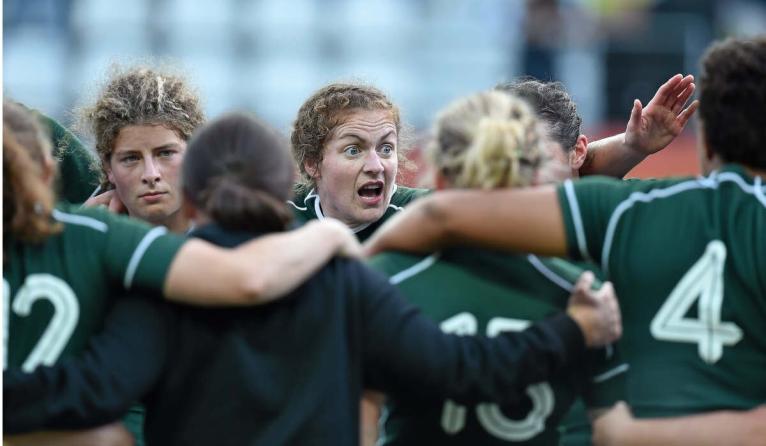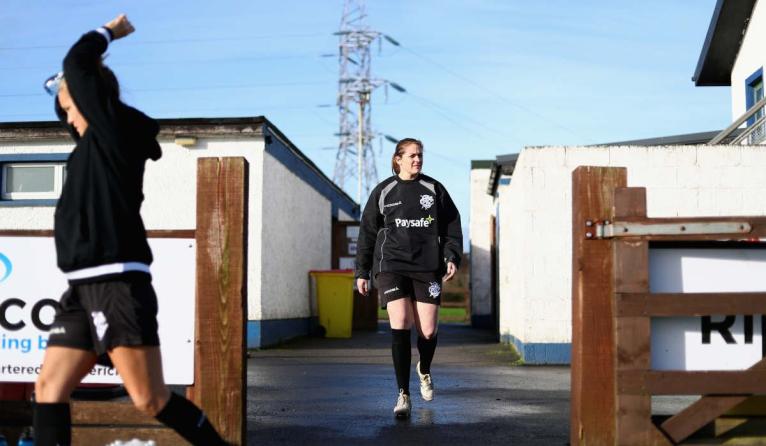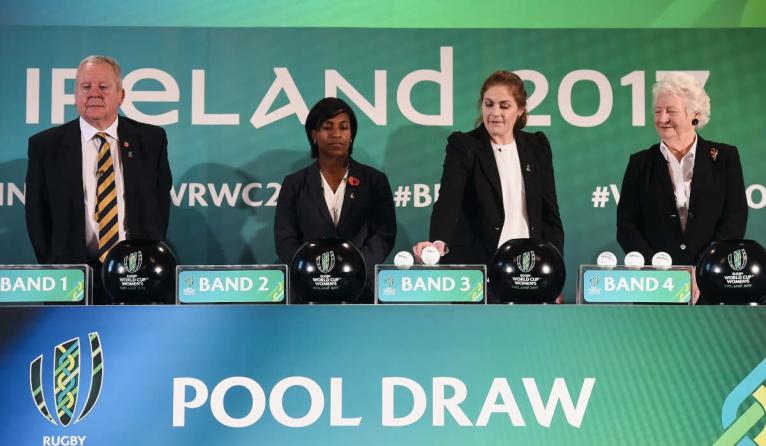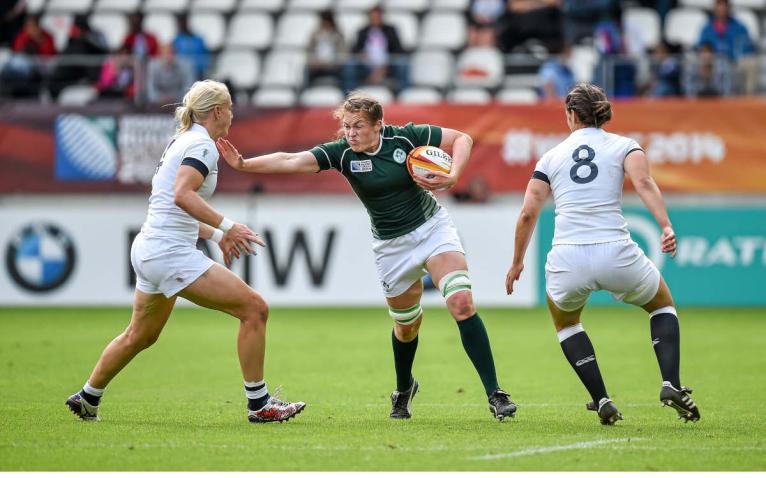It’s an old story but a good one. We are talking about a journey here. But as everyone knows, to go on a journey, it’s no harm to have a mode of transport.
And that was the problem. The train had literally left the station by the time the Irish women’s rugby team arrived at Gare Montparnasse in March 2012, smack bang in the middle of their Six Nations campaign.
The following day, Ireland were due to play France in Pau. They knew about this fixture months in advance. Everyone did. Yet, when the flights were booked, it wasn’t Pau their flights were booked to … but Paris. “Don’t worry,” the team was told. A bus was booked to take them from the airport into the city where a TGV would carry them south.
If only. The bus got stuck in traffic, the train left without them, and all of a sudden the team’s genial coach, Philip ‘Goose’ Doyle, was frantically ringing his bosses in the IRFU to sort this mess out right and sharpish. It’s moments like this when leaders come to the fore and in Fiona Coghlan, Doyle knew he had a good one.
It was Coghlan who gathered the French speakers in the squad together and figured out a plan. The best available option was to get the 30-person squad booked onto the only other train heading out of Paris that day to Pau, an overnight trek that was one step removed from hell.
Meanwhile the clock was ticking. Kick-off was under 23 hours away, Doyle fretful that the game would have to be cancelled. Chaos ensued. That overnight to Pau was swiftly nicknamed the cattle train by the players, who were spread out across two carriages, Goose and his staff members spending the entire journey walking up and down the aisle like sentries, their sole concern to keep the girls safe.

Eventually, at 9.15 on the morning of the game, 23 hours after setting off from Dublin, they landed in their hotel. A request to the French Union to change the kick-off time fell on deaf ears. And so, ahead of one of the biggest games of their careers, Ireland’s players got two hours sleep before delivering a world class performance. The score was France 8-7 Ireland but should have been different as a legitimate Irish try was wiped out.
Meanwhile, another result was playing out. The press had got hold of the story about the chaotic travel arrangements and the fall-out was immediate, the IRFU contacting Goose Doyle to ask how could they put things right. He’d a lengthy wish-list. For Coghlan, a different kind of discussion was unfolding with her team-mates.
“It was kind of like, ‘why is it that the only way the team will get coverage is when there is a big story like this one?’ The focus was never on our incremental improvement because no one really paid any attention to our results,” she recalls.
“The girls (on the squad) were asking afterwards, ‘why are they talking about that (the fall-out from the train journey) rather than the performance?’ But I knew why. I remember saying to them, ‘if you want people talking about you, you have to win something’.”
Within a year they would. This was a squad with big personalities. Coghlan, the prop, was one; Lynne Cantwell, now in charge of the women’s programme with the South African union, another. Then there was Niamh Briggs, a Waterford woman, a great goalkicker, and now the national team’s assistant coach. Together, they made a pact to keep improving. “We pushed one another to get better,” says Coghlan.
Locked into the scrum, no one – figuratively or literally – pushed harder than their captain.
The thing you quickly get about Fiona Coghlan is a certain assurance when she talks rugby. It comes from her experience. Grand Slam winner; captain of the first Irish team to defeat New Zealand. She has a growth mindset.
The thing you quickly get about Fiona Coghlan is a certain assurance when she talks rugby. It comes from her experience. Grand Slam winner; captain of the first Irish team to defeat New Zealand; at the forefront of a campaign to win respect for women’s rugby in Ireland, she has a growth mindset.
It wasn’t enough for her when Ireland beat Wales in the opening game of the 2013 championship. They’d played poorly that day but had a togetherness forged from that horrendous journey from Paris to Pau.
For much of the previous decade, togetherness had taken them so far. There was a first-ever win over Wales in ’05, then Scotland in ’07, France in 2009. England, however, was a scalp they’d yet to take. This time, in February 2013, they did, winning 25-0, Alison Miller scoring a hat-trick.
The Scots were next. Another win and a first ever Triple Crown. “There was no actual Triple Crown trophy,” Coghlan points out. It wasn’t the only thing missing. That year, Ireland were the only team represented at the Six Nations launch – male or female – without a sponsor’s name on their jersey.
If they felt like second class citizens they certainly didn’t complain about it. They’d a job to finish off but a problem had arisen. The Ireland 15s and Ireland 7s programmes had players who had a foot in each camp. For the final two games of their Grand Slam bid, Ireland were in danger of losing a chunk of their squad to a 7s training camp. “The fact they players stayed with us was a real gelling piece.”
They needed all that resolve against France in game three of that campaign as France led 10-5 before a tactical switch and an inspiring talk from their captain did the trick: Ireland 15-10 France. Four wins out of four.

The Italians were next. RTÉ, the state broadcaster, screened the game live, the first time a women’s international had been shown in Ireland. Their voice was finally being heard. It took two kicks from Briggs to win it. “The conditions were a nightmare,” Coghlan said. “It didn’t make for a great spectacle.” No one cared. They’d done something special becoming just the third Irish senior team – after the men of ’48 and ’09 – to win a grand slam. More than that, they were inspiring the next generation.
Eimear Considine, the current international full-back, sat down to watch that game in Kilmihil, west Clare. “I didn’t even know Ireland had a women’s rugby team,” she admitted. “That alerted my interest.” She wasn’t the only one; women’s rugby became Ireland’s fastest growing sport.
It’s reflected in the TV audiences, each Ireland game screened live now, Coghlan’s intelligent observations acknowledged by her regular appearances on the RTÉ punditry circuit. “The fact my opinion is respected is great,” Coghlan says. “Ten years ago, you wouldn’t have heard a woman analyst on TV at all.”
Now it’s a regular thing. It started in 2015 when – now retired – Coghlan commentated on a women’s game. But a year later something else happened. Mark McKenna, the RTE producer was on the line, asking if she was free to do co-commentary on the men’s Olympics Sevens from Rio. Coghlan’s immediate reaction was telling. “Who dropped out?” she asked.
Broadcasting is about being confident and taking opportunities when they arise,” she says. “Sometimes we are barriers to ourselves. You have to put your best foot forward
Fiona Coghlan
The answer was no one. McKenna wanted Coghlan on air because she was the best person for the job. “Broadcasting is about being confident and taking opportunities when they arise,” she says. “Sometimes we are barriers to ourselves. Like, that was the case for me in 2016 when Mark offered me the chance. You have to put your best foot forward.”
She always did as a player, representing Ireland between 2003 and 2014, seeing the team move from ‘the dark days for women’s rugby’ into the light.
These days the Irish women’s games are part of the yearly RTE schedule, drawing sizeable audience figures. But aside from that, Coghlan has a regular seat on the analyst’s chair, irrespective of whether it is men’s or women’s rugby. “Fiona’s excellent,” said former Ireland coach, Eddie O’Sullivan. “She reads the game well and gets her point across impressively time after time.”
With RTE, she became the first woman to co-commentate on a World Cup quarter final and was also one of the first females to do punditry work for BT Sport. “I’m really honoured any time I am asked to do anything,” Coghlan says, “especially when that happened during lockdown. So the fact my opinion is respected is great. I want to keep going and get better at it.”

She never asked to be either a role model or pathfinder but that’s precisely what she has become.
In her day job, as a PE teacher, she organised an underage rugby blitz recently and put the word out there to first and second year girls to see if they’d sign up. Over 100 did. That wouldn’t have happened 10 years ago.
“Until I went to college I didn’t even know women’s rugby existed in Ireland,” says Coghlan. “The most important thing is girls get involved in a sport. Success definitely helps drive that. I have seen a huge increase in participation numbers on the back of what we did from 2012 to 2015.”
A letter was signed by a group of 62 players who said they had no faith in the IRFU’s leadership of women’s rugby. This came on the back of the team’s failure to qualify for the World Cup. In Potts, they had someone prepared to listen.
What really helps is the arrival of Kevin Potts into the chief executive chair at the IRFU. The first job he had to deal with was a letter signed by the biggest names in Irish women’s rugby – including Coghlan, the recently-retired Ireland captain, Ciara Griffin, and nearly 30 current Ireland players.
Sent to the Department of Sport, the letter was signed by a group of 62 players who said they had no faith in the IRFU’s leadership of women’s rugby. This came on the back of the team’s failure to qualify for the World Cup. In Potts, they had someone prepared to listen.

“For me it wasn’t about the last World Cup and what went on. It was about getting the structures right going forward. When people talk and say, ‘let’s make the women’s game professional’, well, that is only part of the answer, because it is not sustainable unless you have proper structures in place.
“But every team in the Six Nations are now professional, so we can’t hang about.
“My personal view is that if they put the structures in place, more numbers will come in. The women’s game is going one direction globally – which is professional – so the longer you wait to hop on board, you are going to be left further behind.”
A decade on from missing the train, Irish women’s rugby is again stuck on a platform, but this time the hope is they’re going to a better place – and there are strong noises that a glut of professional contracts are due to be handed out imminently. They can thank their pathfinder when they eventually get there.


Comments
Join free and tell us what you really think!
Sign up for free